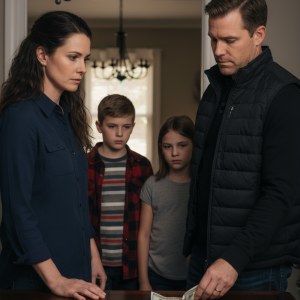Rita thought he was just another broke street singer. Josh Hallaren proved her wrong—with an envelope, a handwritten note, and a kindness that launched two miracles.
A Guitar, a Sidewalk, and a Dream
Josh Hallaren spent most afternoons busking outside the busy patio of Griddle Street Bistro, chasing tips and daylight in equal measure. Every crumpled bill slid into his guitar case was earmarked for one thing: studio time. He believed that if he could just get one proper recording, the rest might follow. Hope was his currency—until the day it turned into something else entirely.
Invited In—But Not Exactly Welcomed
After wrapping a lively set that drew a few claps from diners, the restaurant owner waved Josh inside. “Half-off for performers,” he joked, sliding a menu across. The kindness didn’t extend to their server. Rita, moving fast and tight-shouldered, barely made eye contact. Water hit the table with a splash. Orders came clipped, mechanical. Josh wasn’t offended so much as puzzled; he’d met cool receptions before, but this felt personal.
The Poster No One Could Miss—Except Everyone Did
On his way to pay, Josh paused at a taped flyer near the register. In it, Rita held a little boy with a hospital bracelet and a shy half-smile. LUKE’S MEDICAL FUND screamed the header. Underneath: mounting bills, specialist treatments, insurance gaps. Suddenly her distance made brutal sense. Grief wears many faces; hers had simply been doing its shift.
A Different Kind of Tip
Josh stepped outside, stared at his overstuffed, under-lived guitar case, and argued with himself. Studio time had taken months of busking in the cold. But Luke didn’t have months. Minutes later he walked back in, settled his bill, and slid a plain white envelope beneath the check. Inside: every dollar he had—$1,500 in folded cash—and a note: For Luke. Music can wait; healing can’t. —Josh. Then he slipped out before anyone noticed.
Tears at Table Twelve
Rita found the envelope clearing Josh’s table. The cash spilled into her hands; the note hit harder. She sat down mid-shift and cried—ugly, relief-heavy sobs coworkers pretended not to see. Someone had seen her, really seen her, past the rushed service and worn smile. That night she shared the story on social media, adding a short clip she’d filmed of Josh performing outside before her shift. She tagged the restaurant, the town parents’ group, and a local music page.
The Post That Lit Up the Internet
By morning, the video had rocketed through community groups and into national shares. Millions watched the scruffy guitarist who gave away his recording fund. Streams of Josh’s older tracks—buried on a small upload site—surged. Comments flooded in: offers to pay studio fees, parents sharing their own hospital battles, talent scouts asking for contact info.
Opportunity Knocks in Stereo
Within a week, an indie label reached out, offering studio time and distribution in exchange for a modest deal that protected Josh’s songwriting rights. He said yes—on one condition: the first release would double as a benefit for Luke’s care. The label leaned in. Local radio spun his single. Online presaves turned into real downloads.
A Benefit Show and a Big Number
Two months later the bistro parking lot became an outdoor stage. Diners, neighbors, nurses, and strangers showed up with blankets and wallet-sized donations that added up fast. Between online contributions and ticketed streaming, the night raised $19,000 toward Luke’s treatment—more than ten times what Josh had left in that envelope.
Kindness That Keeps Playing
Luke’s treatments advanced; Rita cut back shifts to be with him. Josh’s debut EP—recorded because he gave away his savings—charted on several streaming playlists. But the part he talks about most isn’t the record deal. It’s the look on Rita’s face the night she told the crowd, “You didn’t just help my son. You gave us time.” One unguarded act had rippled into a community chorus.
Share the Echo
If you were moved by Josh and Rita’s story, consider supporting a family in medical crisis near you. Small gestures—meals, gas cards, child care hours—stack up like harmony lines under a melody. You never know whose life (including your own) they’ll change.





